|
|
|
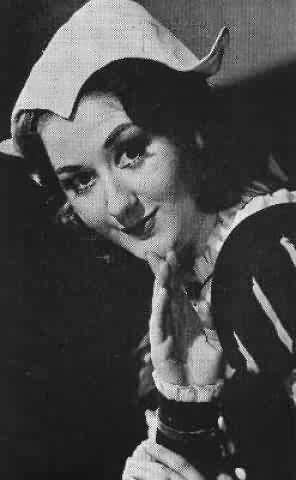 |
What is your favourite role?
Phoebe (Yeomen of the Guard). It is the one that I have played the longest. It is a complete character. I can follow the character through from the curtain up to the end. It is entirely credible, and I suppose somehow she is a little bit like me as well. Yeomen is the nearest thing we do to Grand Opera, and it is the most credible story, and I think that is probably why we all enjoy it. The characters do and say things that make sense.
Next to that, a very close second, is Mad Margaret in "Ruddigore", which is a complete contrast again, a complete riot from beginning to end. Nevertheless you have to believe very very deeply in Mad Margaret. You cannot play her just as someone who comes on and screams and then runs off again. She's got to have a continuing character all the way through the opera for it to make sense. In my opinion you have to believe sincerely in what she's saying and what she's thinking, otherwise it just becomes pure comic routine and it's not G. & S. I love to watch the audience's face when I run on in that red wig and that horrific outfit. She's a sort of Mad Molly Malone without the mussels. They are shocked, they think: "Good God, who's this . . .?"
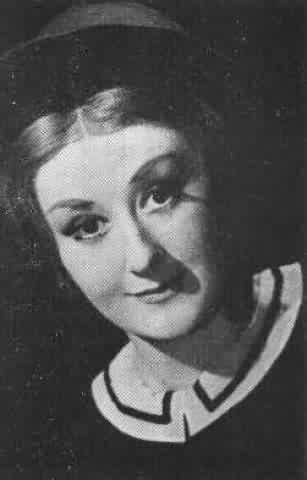 |
Do you always get the same reaction?
Yes, well if I don't I have to work really hard to establish the character. I usually get the shock and then . . . "Oh, look at her hair and her face (because I have this funny make-up on) and everything", then I know I'm all right. Then they know who I am, either mad or a witch or something, and it's up to me to establish what I am after that. The rest of the roles I play . . . I am very lucky to play character roles that are all entirely different. Iolanthe is perhaps the only one that is straight. In the new Sorcerer I play an entirely different role, I play an old lady - which I have never played before - and this is a great challenge. It was a long time before I got my make-up sorted out to go with the wig and the costume and the character, and I probably won't get it right for a long time - it takes an awful long time to work yourself into these parts.
Do you have any guide lines for your parts?
I have to base my characters on people I have either seen or I know or that I have seen on television, and I have based Mrs. Partlet in "The Sorcerer" on a mixture of Hylda Baker and Hermione Gingold. It's easier for me to base a character on someone I know if it's not entirely natural, and then I find if I think right before I go on stage (for instance, if I imagine Hylda Baker) I say a few lines to myself in her sort of idiom, and then I'm thinking like: "I'm a mother and I'm a little bit cheap but I'm trying to be posh to keep up with the rest of the village." If I think that before I go on, funnily enough it comes out right without my thinking consciously about it on stage. The same with Phoebe. I think before I sit at that spinning wheel that I'm a sixteen - or seventeen - year-old girl who really is not in love with Fairfax, but extremely smitten with him, she's got a crush on him . . . in other words, if I think young and think back a few hundred years - for instance, you wouldn't gallop about in a long dress - you have to think that you are in a period dress, you have to move as they would. It is no use doing an 1 8th-Century curtsy, because they did not curtsy with their fingers under their chins, they used to go straight down with hands on both sides of the dress. For me personally, if I think along those lines it comes out, if I'm lucky! But everything else helps, I mean you've got the scenery there - in Yeomen I have the spinning wheel and it's atmospheric before we start. This helps tremendously.
What about Lady Angela?
I've played Lady Angela for some considerable time, in fact I don't remember how long. You see, I used to play Lady Saphir I played her for about three years, and then I took over Lady Angela. I'm sort of stuck with the character as I did it when I first learnt it, terribly intense, a little bit of the Beardsley Prints and Oscar Wilde and Flower Power. Now I'm trying to be a little bit more like Joyce Grenfell, a little younger. I suppose this is experience - I began to sound a little bit like a maiden aunt, so now I'm trying to think a lot younger and a little bit upper-class and debutante and Joyce Grenfell - a mixture of all those. I love the beginning now; I have to conduct the girls. I'm not supposed to conduct them so that they can follow me because I mustn't distract their attention from the conductor, you see. I have to wave my arms about madly and just try and look convincing.
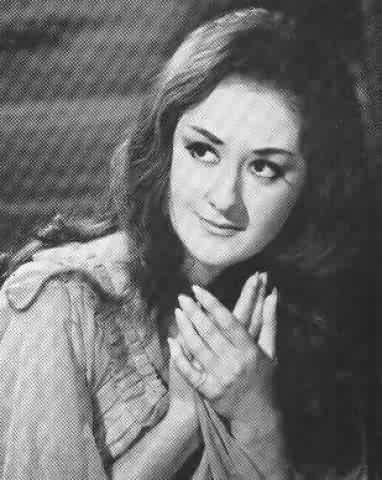 |
Do you find it has more impact now?
Oh yes, I think so, the beginning has. It's faster, which helps the rest of the opera. You know what an old actor once said to me? "Within the first two seconds of your appearance on the stage you establish what your character is, you either make it with the audience or they ignore you for the rest of the show." Those first two seconds are very very important, and the first time you open your mouth is important because after that they may just dismiss you. If they don't want to listen to you they won't, so you have to create the right impression and impact and they have to be able to hear you. It's no use doing this half-way through the show - by then they have forgotten who the heck you are, anyway.
An old actor once told me also that when you have your back to the audience it's a wonderful opportunity for explaining to the audience what you are doing, just acting with your back - he taught me an awful lot. If you are unhappy you lose height, your head sinks a little, and your shoulders bend and your knees bend a bit. You can convey everything - joy, happiness, excitement, apprehension - when you have your back to the audience. These sort of tips were invaluable help to me when I first took over the parts.
Also, you won't find me waiting in the wings a long time before I go on stage because I find that the wings are usually crowded and one gets into conversation and listens to what's going on on stage and you lose your own concentration, so I usually try and stay in the dressing-room and relax and think quietly before I go on stage. It's easy to get put off and, as I say, I have to think all these things before I do the parts, like think young and think old, and I can't do that when I'm on show in the wings because the wings are part of the stage.
You haven't said much about "The Mikado".
Well, there again I've played two parts, Peep-Bo for three years and then I have played Pitti-Sing ever since. That's a fun show from beginning to end. I love Mikado actually, because we do it at matinees an awful lot and we often get children in, and I love to hear children laugh. I think the greatest joy in my life in this whole job is making people laugh. I guess that's why I'm a comedienne, anyway. But I really feel that I've scored something above average if I can make people laugh. Perhaps I don't make it all the time, but I try twice as hard next time. Everything isn't always laughs. Iolanthe is very sad, and I have to try very hard to be sincere and make the character believable in the end, which is the important part of Iolanthe. Pitti-Sing is a great laugh - it's a terrific amount of fun in the second Act with John and Ken, and of course we're so used to working with each other that if anything different happens we know what the other's going to do. l t's a marvellous show - it is the most popular we do. It's a good job I like it really, we do it so often.
Could you tell me a little more about lolanthe?
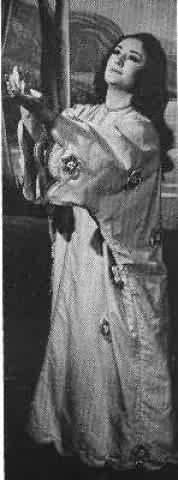 |
It's a challenge for me because it's a straight role. I prefer the comedy stuff, lolanthe is quite a different thing. It's a lovely song at the end, but you are on your knees in the middle of the stage pleading for your son's life, and your knees hurt like hell after a while, and I have got to concentrate terribly on the singing of the song, and that song's a great challenge to me. I try so hard to do it better every time. You have to be sincere, but you have to get the words over. They are strange words, anyway she's hinting about the past. She's reminding him of his wife long gone, and hinting she might still be around somewhere. Although it's my least favourite role, it's a challenge, and that makes up for the fact that I don't like it. I like making people laugh more than anything else.
Tell me about some of the funny things that have happened to you on stage.
One night as Phoebe I had the old spinning wheel, which was a smaller compact job, incredibly old, and it collapsed under me and I was trying to hold it together. You have no idea how many pieces of wood go into making a spinning wheel. And as each piece fell off I was madly trying to remember the words and sing the song and look as though this happened every night. I ended up with a heap of wood on the floor, and had to pick up all these pieces up and stomp off with them - terrible!
One night, the last day of the London season - I swear this was an accident - in "Patience" I'm supposed to sing 'But who is this, whose god-like grace proclaims he comes of noble race', and for some inexplicable reason I sang 'But who is this whose god-like grace proclaims he comes from outer space'. The whole company collapsed, and Ken Sandford came on and wondered what everyone was laughing at - he thought his flies were undone.
Elastic is frequently going. It happened to me once in "The Gondoliers". We had pantaloons plus a petticoat, and when I ran on the stage I tripped and fell flat on my face and was terribly embarrassed; then I felt this elastic going, and I was skipping round in a big circle with someone holding each band, and I couldn't do a thing about it. They ended up wrapped around my ankles so that I couldn't move properly. I was completely oblivious of the audience by this time, wondering how I could get these things off my legs. I stood on one end and pulled that leg out, and stood on the other end and pulled that leg out, and kicked them off into the wings, and as I kicked them off my shoe went sailing off into the wings. The audience fell about - it was the biggest laugh of the night. I was mortified.
Did you like playing in The Gondoliers?
Yes, I did really, it was a gay show, a happy show. I was in the chorus and understudy for four years. I firmly believe in the chorus as a wonderful training ground. I believe in experience as the best teacher perhaps that's true in all walks of life.
What else do you play?
I have played both Kate and Edith in Pirates, too, and that was very interesting. It's marvellous to swap a character you know. I played Tessa in "The Gondoliers" for a year or two, but that was some time ago! Also I used to play Ruth in "Ruddigore", before taking over Mad Margaret. I think what keeps me fresh is that I'm not working every night, which enables me to catch up on normal life.
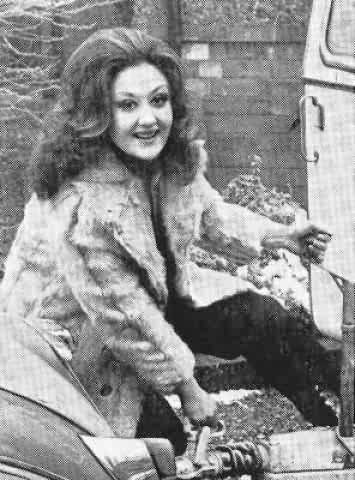 |
Ah yes, 'normal life' - what does that mean to you?
Well, there's my own 300-year-old cottage in Hertfordshire, which is just like the Forth Bridge; you start at one end, and by the time you get to the other you have to start at the beginning again. The garden's a bit like that as well. It's all overgrown when I get back there; I have to go out and do things to the garden so that I can see the back gate, and I have a gardening firm helping me, which is tremendous.
I also like to see as much of my mother as possible. She lives in Newark, Notts, which is where I was brought up and first got the taste for the theatre. I have two dogs which I got from the R.S.P.C.A. - one is Mandy, a mongrel, and the other Judy, a Jack Russell, who is Houdini in disguise because she keeps escaping. In Nottingham she went off for a whole night and came back the next morning with a cut foot, blood pouring from her back leg, and she went around on three legs; and about three days after that she disappeared for the whole day. She just goes out rabbiting; she comes back like she's been down a coal mine and usually a bit hurt in some way or another, she's scratched her paws out or something. She does come back, although she's a nut; I'm sure that's how she ended up at the R.S.P.C.A. in the first place, because she could not find her way back from rabbiting. I just went down for tea between the shows and she'd broken her way out of my caravan and the window was screwed tight at about two inches - there she was digging away. I've had her for two years in October, and Mandy since January. I got her for a companion; I'm very keen on the R.S.P.C.A. and I collect for the P.D.S.A. (People's Dispensary for Sick Animals) - a free service for people who cannot afford treatment for their animals.
I'm a great Do-it-Yourself addict. I've renovated my cottage a lot. I'm in the process at the moment of exposing the fireplace upstairs in the main bedroom which had been blocked up under steel and cement and everything. Behind it all is the most beautiful fireplace rising up from the ingle nook downstairs, and when I have it finished (it's got beams in and everything) it's going to look the most beautiful thing; it's got great big alcoves on either side, with the chimney breast getting smaller and going up to the top. It needs a lot of work, and this takes a lot of my time up when I'm away.
I love history. If I am on tour and cannot get home you will find me in the local museum or the local castle. I love tramping over archaeological harrows, remains - anything. The dogs like it too!
I was an art student for three years. It's very handy for doing up cottages. I have an idea of colour, and love sketching; I used to sketch people in the company, and have a fantastic selection of sketches of people who have left the company now. I don't have so much time for that now. I have found that touring can be a very strange life. Entirely apart from the whole country - from the whole world; you tend to think of D'Oyly Carte as your world. I find that I get back to the caravan and the grass and countryside, and I get everything back into perspective. I know that the earth will go on long after I've gone.
That's why you have stuck to the caravan?
Yes, I'm terribly happy there. I love the freedom of life, my cooking has improved, and I can have the dogs. I love the country, and you are always with strangers in a town. Many towns we go back to every year, but essentially you are a stranger. The thing that doesn't change is the scenery outside the caravan, and, I suppose, the operas - the theatre's always the same; you walk in and there's the same people. You need never be alone. That's what makes touring bearable.
(Note: After delighting audiences for 15 years Miss Jones was greatly missed when she left the company in 1973.)
| Artist Index | Main Index |